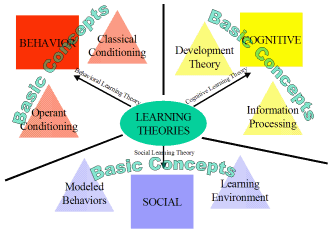
Social Learning Theory - Web Quest

- Behavioral Theory
- Cognitive Theory
- Social Learning Theory
- Introduction
- Task
- Process
- Resources
- Evaluation
- Conclusion
Conclusion
Reflection
Social learning theory is the study of how people, behaviors, and the environment are inner-related. It is a rejection of behaviorism and cognitivism, because neither take environmental influence into condsideration. Social learning theory believes that learning occurs largely through modeling.
Behaviorists would stand by their beliefs that learning is an observabe change in behavior through a series of stimulus and response. Behaviorists do not believe that the environment has any effect on this stimulus-response relationship or the learning that occurs. However, social learning theorists insist that learning is not merely a change in behavior, and that the learner is directly influenced by the model, whether live, symbolic, or verbal.
Cognitivists, on the other hand, would also disagree. They believe, however, that learning occurs from a change in mental state, possibly an unobservable change. They also do not believe that the environment effects this learning. Cognitive learning occurs through a process of shaping and organizing information through working memory into long-term memory for later recal. Social learning theorists do not agree with the cognitive postion of imposing knowledge onto the learner. They believe that each learner can achieve different results based on the environment. It is the task of the model to transfer the necessary skill or knowledge onto the learner.
References
Ormrod, J.E. (1999). Human Learning (3rd Edition). Upper Sadle River, NJ: Merrill Prentice Hall.
Gagne, R.M., Briggs, L.J., & Wager, W.W. (1992). Principles of Instructional Design, 4th Edition. Harcourt Brace Jovanovich College Publishers.
Emory University. Updated September 2, 2003. "Albert Bandura Biographical Sketch" http://www.emory.edu/EDUCATION/mfp/bandurabio.html. (November 10, 2003).
